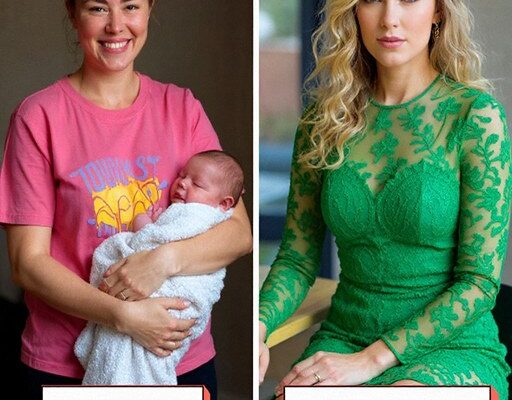Linda sat on the edge of her unmade bed, surrounded by the sounds of chaos that had become the background music of her life. Somewhere down the hall, her youngest, Ellie, was crying because her older brother had stolen her favorite toy. In the kitchen, something was boiling over on the stove, hissing in protest. The house smelled faintly of milk, crayons, and exhaustion. Linda ran a hand through her tangled hair and took a deep breath before forcing herself up again.
She wasn’t sure when mornings had started to feel like battles—maybe when she’d had her second child, maybe before. All she knew was that she hadn’t had a proper night’s sleep in five years. The mirror on her dresser reflected someone she barely recognized: hair hastily tied up, eyes framed with dark circles, a shirt with a faint stain that she hadn’t noticed before. She used to be stylish once—before the kids, before the endless laundry, before the days blurred together.
That’s when David appeared in the doorway. He was dressed neatly, of course, in a crisp shirt and pressed trousers, smelling faintly of cologne. He looked like he was heading to a photoshoot rather than to work. “You always look like you just rolled out of bed,” he said, smirking as his eyes swept over her.
Linda froze, clutching the baby monitor in her hand. “Good morning to you too,” she said flatly, trying not to sound as tired as she felt.
“I’m just saying,” David continued, adjusting his tie in the mirror. “You could at least try, Linda. Some women still take pride in their appearance even after having kids. Look at Claire from my office—she’s got twins, and she still looks amazing every day.”
Linda’s chest tightened. She knew Claire. She was tall, confident, always in heels, with sleek blonde hair and an easy laugh. Claire didn’t have three kids under six. Claire didn’t have a husband who barely looked up from his phone during dinner.
“I’m sorry I don’t have time to curl my hair when I’m trying to keep three humans alive,” Linda muttered, heading toward the kitchen before she said something she’d regret.
David sighed dramatically, as though he were the one burdened by the weight of parenthood. “I’m not asking for much,” he said, following her. “Just a little effort. You used to care about how you looked.”
Linda didn’t respond. She poured cereal for the kids and tried to ignore the sting in her chest. She remembered how she used to wear red lipstick when they were dating because David said it made her smile look radiant. Now he rarely even noticed when she smiled at all.
The rest of the morning passed in a blur of spilled milk, missing shoes, and tears. When David finally left for work, she stood at the sink washing dishes, staring out the window at nothing. Her reflection in the glass looked worn and distant.
That night, after she’d put the kids to bed, Linda sat alone on the couch. She scrolled through old photos on her phone—pictures of her and David when they were newly married. They looked so happy then. He used to tell her she was beautiful even when she had no makeup on. Somewhere along the way, that man had disappeared, replaced by someone colder, more dismissive.
She thought about confronting him, but what would be the point? He’d just roll his eyes, make another joke about how sensitive she’d become. Still, something inside her started to shift. She was tired of feeling invisible in her own marriage.
The next few weeks were more of the same—David’s cutting remarks, his subtle jabs, his constant comparisons. “You should see how Claire organized the company picnic,” he said one evening while Linda scraped spaghetti off the highchair. “She’s just so efficient.”
Linda felt her blood run cold. Claire again. Always Claire.
One afternoon, while folding laundry, Linda heard David’s phone buzz on the counter. Normally, she wouldn’t have touched it. But the name Claire lit up on the screen, followed by a heart emoji. Her stomach dropped.
Her hands shook as she picked up the phone. The message preview read: Had an amazing time yesterday. Can’t stop thinking about you.
The room spun. She opened the thread—hundreds of messages, photos, and inside jokes. One image nearly made her drop the phone: a selfie of Claire, taken in what looked unmistakably like a hotel room. And another message from David: You looked perfect, as always. Can’t wait to see you again.
Linda sat down, the phone slipping from her hand. Her heart pounded so hard it hurt. So that was it. All the comments, all the comparisons—they weren’t random. They were projections, justifications for what he was already doing.
That night, when David came home, she didn’t say a word. She made dinner, tucked the kids in, and pretended everything was normal. But as she lay in bed next to him, listening to his even breathing, a plan began forming in her mind. She wasn’t going to scream, cry, or beg. She was going to make him regret every cruel word, every smirk, every betrayal.
Over the next few weeks, Linda played her part perfectly. She smiled at him, laughed at his small talk, and acted like nothing had changed. She even took extra care with her appearance—not for him, but for herself. She started exercising again during the kids’ nap times, eating better, getting her hair done. Slowly, she began to feel like the woman she used to be—not because David noticed, but because she did.
And while she rebuilt herself, she planned. David’s birthday was coming up, and he loved attention—loved being the center of every celebration. He’d been bragging about how he wanted a big party this year, something “memorable.” Linda decided she’d give him exactly that.
She started by quietly reaching out to one of David’s coworkers, a kind man named Mark who had always treated her with respect. Through a few careful conversations, she confirmed what she already suspected: everyone at the office knew about David and Claire. They weren’t subtle. Some people even assumed Linda knew and didn’t care.That stung more than anything—the idea that her humiliation had become casual office gossip. But she pushed through the pain. Instead of confronting David directly, she asked Mark for a favor. She wanted to plan a surprise party for David at home. She needed help inviting the “right” people—his coworkers, his boss, and, most importantly, Claire.
Mark hesitated but agreed, understanding more than he said aloud.
The following weeks were a blur of preparation. Linda decorated the house with balloons and banners, ordered David’s favorite food, and even hired a photographer—a professional, not for memories, but for evidence. She sent invitations under her own name, making sure Claire got one.
On the day of the party, Linda woke early, dressed in a soft blue dress that flattered her figure, and put on makeup for the first time in months. She looked at herself in the mirror and almost smiled. For once, she didn’t see exhaustion—she saw purpose.
By evening, the house was glowing with lights and chatter. David arrived home, confused at first, then delighted when everyone shouted, “Surprise!” He beamed, soaking up the attention, shaking hands and laughing loudly.
Linda played the perfect hostess. She greeted everyone with warmth, refilled drinks, and stayed by David’s side, pretending that this was just another happy occasion. Then, half an hour into the party, she saw Claire walk in—elegant, smiling, completely unaware.
David froze for just a second when he saw her. Claire’s expression flickered with confusion when she spotted Linda standing beside him. Linda stepped forward smoothly. “Claire! I’m so glad you could make it,” she said, her voice sugar-sweet.
Claire blinked, then forced a smile. “Oh—of course. I didn’t realize—”
“That it was me hosting?” Linda said, cutting her off. “Yes, I thought it’d be nice to do something special for David. After all, he’s been so close with everyone at work lately.”
The room quieted slightly. David’s face flushed, but he quickly forced a laugh. “Honey, maybe you should—”
Linda raised a hand. “Actually, David, I have a little surprise for you too.”
She turned toward the photographer, who nodded. The lights dimmed slightly as Linda picked up the remote for the TV. “Everyone, I thought it’d be fun to show a little slideshow—some memories of David over the years.”
The screen flickered to life. At first, there were harmless photos—David at work, David playing with the kids. Laughter filled the room. Then the next slide appeared. A photo of David and Claire—taken in that hotel room.
A collective gasp rippled through the crowd. The next slide was a text exchange. Then another. The laughter died.
David’s face turned white. “Linda, what the hell are you doing?”
“I’m giving you what you wanted,” she said calmly. “A birthday you’ll never forget.”
Claire’s face had gone crimson. People started murmuring, awkwardly excusing themselves. David lunged for the remote, but Linda stepped back. “You always said I should put more effort into things,” she continued, her voice steady. “So I did.”
The slideshow ended with a family photo—Linda and the kids, smiling in front of their home. “The kids and I will be moving out tomorrow,” she said quietly. “I already spoke to a lawyer. Oh—and I sent a copy of these photos to your boss. I thought he should know what kind of man represents the company.”
David’s mouth opened and closed, but no words came out.
Linda turned and walked away, the sound of whispers chasing her down the hall. She didn’t look back. She didn’t need to.
The next morning, she packed the kids’ things and left. The house felt eerily quiet as she closed the door behind her. She drove to her sister’s place in another town, where the kids ran laughing through the backyard while Linda sat on the porch, sipping coffee for the first time in peace.
The weeks that followed were a mix of grief and relief. There were nights she cried silently, mourning the life she thought she had. But there were also mornings she woke up feeling lighter, freer. She found a part-time job at a local bookstore and started taking evening classes in graphic design—something she’d always wanted to learn.
David called a few times at first, begging her to talk, to “work things out.” She didn’t answer. Then came the angry messages, accusing her of humiliating him, of overreacting. She ignored those too. Eventually, he stopped trying.
Months passed. One day, Linda ran into Mark again while she was picking up coffee. He looked sheepish but smiled warmly. “You look great, Linda,” he said. “Really great.”
“Thank you,” she replied, genuinely smiling back.
“You know,” he added after a pause, “people still talk about that party.”
Linda laughed softly. “I bet they do.”
As she walked out into the sunlight, she realized she wasn’t angry anymore. She’d been broken once—by exhaustion, by neglect, by betrayal—but she’d rebuilt herself piece by piece. She wasn’t the woman who rolled out of bed anymore. She was the woman who stood back up.
And for the first time in a long while, she was proud of what she saw in the mirror.



